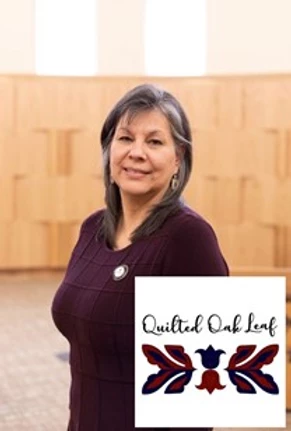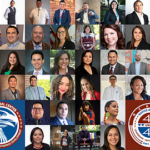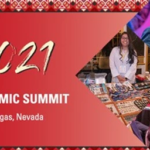Quilted Oak Leaf, LLC, a fabric and gift shop “where friendships and creations are made,” was opened by owner Julie Winchester-Farver on March 5, 2020 – just before the COVID-19 pandemic reached its height. For many business owners, this series of events would be devastating. However, Winchester-Farver committed to “become creative,” putting time and energy into Facebook advertising, getting a new website up and running, and offering one-on-one social distanced or video-chat shopping sessions. Recently, Quilted Oak Leaf began allowing a limited number of patrons to browse the store and hosting small, socially distanced and masked-up, quilting lessons.
We hope you enjoy learning more about how Julie Winchester-Farver has guided Quilted Oak Leaf – a traditionally hands on business (as Julie says, “quilters want classes!”) – through the COVID-19 pandemic.
1. Tell us a little about yourself and your business
My name is Julie Winchester-Farver. I am a citizen of the Pokagon Band of Potawatomi and owner of Quilted Oak Leaf, LLC, a 100% Native Woman-owned business. I opened Quilted Oak Leaf on March 5, 2020, just four miles outside of the town of Dowagiac, Michigan, with the hopes of being a “Destination Quilt Shop.” We are a fabric and gift shop that provides fabric, quilt notions/supplies, gifts for the home and babies, black ash baskets made by Pokagon Band tribal citizen John Pigeon, and in the future plan to offer quilting classes and other Pokagon artist works. The tag line for Quilted Oak Leaf is “Where Friendships and Creations are Made”.
I began quilting in 2001 with the encouragement of my cousin, Majel DeMarsh, and have made quilts for a number of charitable organizations. This includes the raffle at the annual Michigan State University Pow Wow, with all proceeds going to the John R Winchester Endowment Fund. I also make quilts for the Pokagon Band Family Welfare Commission/Social Services Department, provided to Native children that have been adopted or have been reunified with their families.
I worked with a group of ladies in October 2019 to help them make their own lap-size quilt for Domestic Violence Awareness Month. It was exciting to see the ladies with their finished blankets and how happy they were with how they turned out. We had a lot of fun working and helping one another.
The quilts that I have created for the Pokagon Band have a version of the Potawatomi Oak Leaf woven into the quilt. In addition, for the most part I use fabrics that are called batiks. Batiks have the look of tie-dyed fabric. The fabrics I choose have prints in them that reflect our Native culture. Using animals that may reflect clans such as deer, turtles, bear, eagles as well as, feathers, dragon flies, butterflies, etc.
I have dreamed of owning my own shop since the late 1990s, but at that time it was a gift shop. Then I started quilting and my love for fabric turned into adream of owning a quilt shop. As I was making and creating all these quilts over the years, I was beginning to have what seemed like was my own little fabric shop in my house. Any quilter/sewer knows we can never have enough fabric! The short time that I have had my shop open, I have had the pleasure of meeting new people and having “sew” much fun!!! I love what I am doing.
2. How has your business been affected by COVID-19?
Quilted Oak Leaf opened March 5, 2020; two and half weeks before COVID-19 shut everything down. In those first two weeks, the shop did more business than I had imagined it would, then COVID hit and shut everything down. I closed the shop for about 3-4 weeks, and during that time I was able to get my website up and running. The online business did help a little and continues to be slow. Orders do come in through the website, some weeks there are not any orders, and other weeks there are as many as seven. I am still working on getting the website marketed.
After about three weeks I decided I had to become creative. Facebook is an amazing tool for business. I started posting that I would take personal appointments for shoppers to come to the shop one at a time, and did facetime appointments as well, walking customers through the shop with my iPhone. This creativity helped immensely. The business was not doing as well as those first two weeks, but I was making sales. Then towards the end of May I decided to open the shop, however making sure that I was safe about it. Masks are required, capacity is limited to four customers at a time, and we sanitize high touch items after every customer leaves the building.
In June I opened up to five days a week, and in July I changed the limit to six customers at a time. Business has slowly picked up week after week since June. In August I had my Grand Opening, which was supposed to be in May. The Grand Opening went very well.
I am still working on marketing my website. Facebook continues to be my tool to get the word out and remind customers that I am open. I will say that my online sales are catering to the Native Community. I say this because of the type of fabric that is being ordered and the locations that I am sending the fabric.
3. How has your business model changed since the pandemic started?
In addition to some of the changes I’ve already described, the original plan was to have classes and I have had to put those off for safety reasons. Quilting ladies want classes!! I have done a few one on one classes and this last week I had a local lady come in and conduct a class with five quilters. It went very well, and the ladies had a great time. They can’t wait until they have their next class.
4. What advice would you give to aspiring Native entrepreneurs?
Be confident in yourself. I wanted to have a shop for 20 years before I was finally able to open one, and I knew that someday I would. Everything finally fell into place for me to have the ability to do so. Honestly, if I would have attempted this 10-15 years ago, I do not think it would have worked. It took me that long to gain the experience and confidence to be able to open the shop.
A business plan is a must. I dabbled over the years talking with bankers, and the first question always was “Do you have a business plan?” This question would always discourage me, and I would think “why do I need a business plan? I know what I am doing!” A business plan is a MUST. It really makes you think and look at the big picture. Boy, did I stress the whole time I worked on my business plan. I got through it, and I realize now how important it is, and that it needs to be modified as things change.











